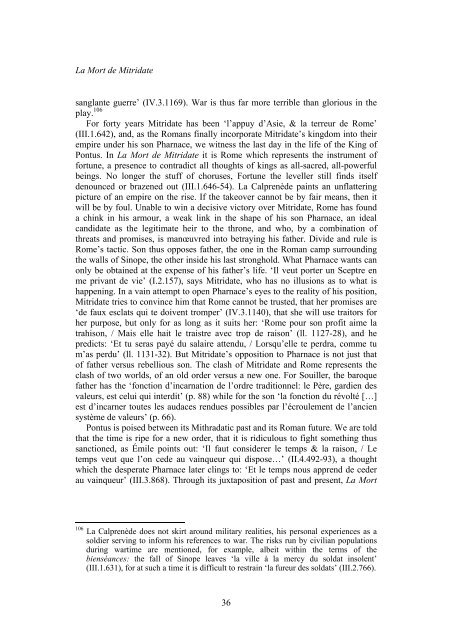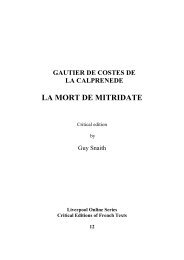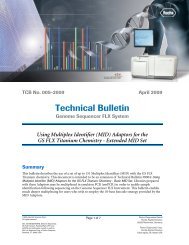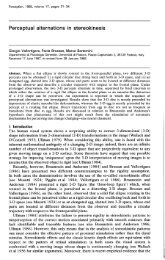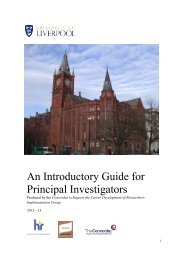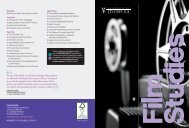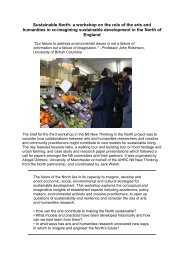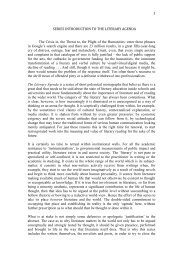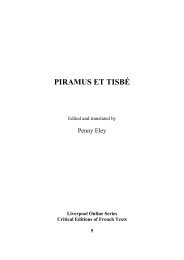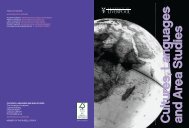LA MORT DE MITRIDATE - University of Liverpool
LA MORT DE MITRIDATE - University of Liverpool
LA MORT DE MITRIDATE - University of Liverpool
Create successful ePaper yourself
Turn your PDF publications into a flip-book with our unique Google optimized e-Paper software.
La Mort de Mitridate<br />
sanglante guerre’ (IV.3.1169). War is thus far more terrible than glorious in the<br />
play. 106<br />
For forty years Mitridate has been ‘l’appuy d’Asie, & la terreur de Rome’<br />
(III.1.642), and, as the Romans finally incorporate Mitridate’s kingdom into their<br />
empire under his son Pharnace, we witness the last day in the life <strong>of</strong> the King <strong>of</strong><br />
Pontus. In La Mort de Mitridate it is Rome which represents the instrument <strong>of</strong><br />
fortune, a presence to contradict all thoughts <strong>of</strong> kings as all-sacred, all-powerful<br />
beings. No longer the stuff <strong>of</strong> choruses, Fortune the leveller still finds itself<br />
denounced or brazened out (III.1.646-54). La Calprenède paints an unflattering<br />
picture <strong>of</strong> an empire on the rise. If the takeover cannot be by fair means, then it<br />
will be by foul. Unable to win a decisive victory over Mitridate, Rome has found<br />
a chink in his armour, a weak link in the shape <strong>of</strong> his son Pharnace, an ideal<br />
candidate as the legitimate heir to the throne, and who, by a combination <strong>of</strong><br />
threats and promises, is manœuvred into betraying his father. Divide and rule is<br />
Rome’s tactic. Son thus opposes father, the one in the Roman camp surrounding<br />
the walls <strong>of</strong> Sinope, the other inside his last stronghold. What Pharnace wants can<br />
only be obtained at the expense <strong>of</strong> his father’s life. ‘Il veut porter un Sceptre en<br />
me privant de vie’ (I.2.157), says Mitridate, who has no illusions as to what is<br />
happening. In a vain attempt to open Pharnace’s eyes to the reality <strong>of</strong> his position,<br />
Mitridate tries to convince him that Rome cannot be trusted, that her promises are<br />
‘de faux esclats qui te doivent tromper’ (IV.3.1140), that she will use traitors for<br />
her purpose, but only for as long as it suits her: ‘Rome pour son pr<strong>of</strong>it aime la<br />
trahison, / Mais elle hait le traistre avec trop de raison’ (ll. 1127-28), and he<br />
predicts: ‘Et tu seras payé du salaire attendu, / Lorsqu’elle te perdra, comme tu<br />
m’as perdu’ (ll. 1131-32). But Mitridate’s opposition to Pharnace is not just that<br />
<strong>of</strong> father versus rebellious son. The clash <strong>of</strong> Mitridate and Rome represents the<br />
clash <strong>of</strong> two worlds, <strong>of</strong> an old order versus a new one. For Souiller, the baroque<br />
father has the ‘fonction d’incarnation de l’ordre traditionnel: le Père, gardien des<br />
valeurs, est celui qui interdit’ (p. 88) while for the son ‘la fonction du révolté […]<br />
est d’incarner toutes les audaces rendues possibles par l’écroulement de l’ancien<br />
système de valeurs’ (p. 66).<br />
Pontus is poised between its Mithradatic past and its Roman future. We are told<br />
that the time is ripe for a new order, that it is ridiculous to fight something thus<br />
sanctioned, as Émile points out: ‘Il faut considerer le temps & la raison, / Le<br />
temps veut que l’on cede au vainqueur qui dispose…’ (II.4.492-93), a thought<br />
which the desperate Pharnace later clings to: ‘Et le temps nous apprend de ceder<br />
au vainqueur’ (III.3.868). Through its juxtaposition <strong>of</strong> past and present, La Mort<br />
106 La Calprenède does not skirt around military realities, his personal experiences as a<br />
soldier serving to inform his references to war. The risks run by civilian populations<br />
during wartime are mentioned, for example, albeit within the terms <strong>of</strong> the<br />
bienséances: the fall <strong>of</strong> Sinope leaves ‘la ville à la mercy du soldat insolent’<br />
(III.1.631), for at such a time it is difficult to restrain ‘la fureur des soldats’ (III.2.766).<br />
36


